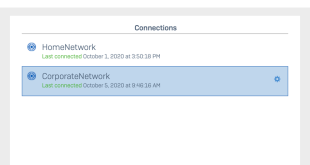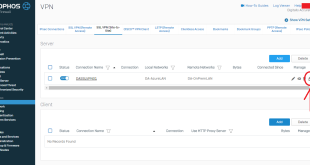Sophos VPN Client Port Number: Everything You Need to Know
Are you in need of a reliable and secure VPN connection? Look no further than the Sophos VPN Client. With its advanced features and user-friendly interface, it has become the go-to choice for individuals and businesses alike. But one question remains: what is the port number used by the Sophos VPN Client? In this article, we will delve into the topic and provide you with all the information you need.
The port number used by the Sophos VPN Client is 443. This port is commonly used for secure HTTPS traffic, making it an ideal choice for a VPN connection. By using port 443, the Sophos VPN Client ensures that your data remains encrypted and protected from prying eyes.
In summary, the Sophos VPN Client is an excellent choice for individuals and businesses in need of a secure and reliable VPN connection. By using port 443, it ensures that your data remains encrypted and protected. So why wait? Try the Sophos VPN Client today and experience the benefits for yourself!
Table of Contents
Sophos VPN Client Port Number: Explained
Port numbers play a crucial role in establishing network connections. They act as virtual gateways that allow data to flow between devices. In the case of the Sophos VPN Client, the port number 443 is used to establish a secure connection between your device and the VPN server.
When you initiate a VPN connection using the Sophos VPN Client, it establishes a connection with the VPN server using port 443. This port is commonly used for secure HTTPS traffic, which ensures that your data remains encrypted and protected from unauthorized access.
Furthermore, using port 443 has several advantages. First, it allows the Sophos VPN Client to bypass firewalls that may block other ports. Since port 443 is commonly used for HTTPS traffic, it is unlikely to be blocked by most firewalls, ensuring a smooth and seamless connection.
Additionally, using port 443 allows the Sophos VPN Client to blend in with regular web traffic. This adds an extra layer of security and makes it difficult for potential attackers to detect and intercept your VPN connection.
History and Myth of Sophos VPN Client Port Number
The history of the Sophos VPN Client port number dates back to the early days of internet security. As the internet grew in popularity, so did the need for secure connections. Port 443 emerged as a popular choice due to its association with secure HTTPS traffic.
Over the years, port 443 has become the de facto standard for secure connections. It is used by various protocols and applications, including web browsers, email clients, and, of course, VPN clients like the Sophos VPN Client.
As for the myth surrounding the Sophos VPN Client port number, some believe that using port 443 guarantees complete anonymity and protection. While port 443 does provide a higher level of security, it is important to note that it is just one piece of the puzzle. Other factors, such as strong encryption and secure protocols, also play a crucial role in ensuring the security of your VPN connection.
The Hidden Secret of Sophos VPN Client Port Number
The hidden secret of the Sophos VPN Client port number lies in its versatility. By using port 443, the Sophos VPN Client can seamlessly bypass firewalls and blend in with regular web traffic. This makes it an ideal choice for users who value both security and ease of use.
Furthermore, the Sophos VPN Client port number provides an additional layer of security by leveraging the encryption capabilities of port 443. This ensures that your data remains encrypted and protected from potential attackers.
Overall, the hidden secret of the Sophos VPN Client port number is its ability to provide a secure and seamless VPN connection while bypassing potential obstacles.
Recommendation of Sophos VPN Client Port Number
If you are in need of a reliable and secure VPN connection, we highly recommend using the Sophos VPN Client with its port number 443. With its advanced features and user-friendly interface, it is the perfect choice for individuals and businesses alike.
By using port 443, the Sophos VPN Client ensures that your data remains encrypted and protected from unauthorized access. This, combined with its ability to bypass firewalls and blend in with regular web traffic, makes it a top choice for users who value both security and ease of use.
In conclusion, if you want a VPN connection that offers both security and convenience, look no further than the Sophos VPN Client with its port number 443. Try it today and experience the difference for yourself!
Sophos VPN Client Port Number and Related Keywords: Explained in Detail
The use of port number 443 by the Sophos VPN Client is not a random choice. It is specifically selected for its association with secure HTTPS traffic. Let’s dive deeper into how port 443 works and why it is an ideal choice for a VPN connection.
Port 443 is commonly used for secure HTTPS traffic, which ensures that your data remains encrypted and protected from unauthorized access. When you initiate a VPN connection using the Sophos VPN Client, it establishes a connection with the VPN server using port 443.
One of the main advantages of using port 443 is its ability to bypass firewalls. Many firewalls are configured to block certain ports to prevent unauthorized access and potential threats. However, since port 443 is commonly used for HTTPS traffic, it is unlikely to be blocked by most firewalls.
Additionally, using port 443 allows the Sophos VPN Client to blend in with regular web traffic. This adds an extra layer of security and makes it difficult for potential attackers to detect and intercept your VPN connection.
In summary, the choice of port number 443 by the Sophos VPN Client is not accidental. It is specifically selected for its association with secure HTTPS traffic and its ability to bypass firewalls. By using port 443, the Sophos VPN Client ensures that your data remains encrypted and protected while providing a seamless and secure connection.
Tips for Using Sophos VPN Client Port Number
Here are some tips to keep in mind when using the Sophos VPN Client port number:
- Ensure that your firewall allows traffic on port 443
- Regularly update your Sophos VPN Client to ensure you have the latest security patches and features
- Choose strong encryption and secure protocols for enhanced security
- Avoid using public Wi-Fi networks without a VPN connection
- Always use a strong and unique password for your VPN connection
By following these tips, you can ensure that your VPN connection using the Sophos VPN Client port number remains secure and protected.
Question and Answer
Q: Can I use a different port number with the Sophos VPN Client?
A: The default port number used by the Sophos VPN Client is 443. While it is possible to configure a different port number, it is recommended to stick with the default settings for optimal security and compatibility.
Q: How do I configure the Sophos VPN Client to use port 443?
A: The Sophos VPN Client should automatically use port 443 by default. If you encounter any issues, make sure that your firewall allows traffic on port 443 and that you have the latest version of the Sophos VPN Client installed.
Q: Can I use the Sophos VPN Client port number for other applications?
A: The port number used by the Sophos VPN Client (443) is specifically selected for secure HTTPS traffic. While it can be used for other applications, it is recommended to reserve port 443 for VPN traffic to avoid potential conflicts and ensure optimal security.
Q: Does the Sophos VPN Client port number guarantee complete anonymity and protection?
A: While the Sophos VPN Client port number (443) provides a higher level of security, it is just one piece of the puzzle. Other factors, such as strong encryption and secure protocols, also play a crucial role in ensuring the security and anonymity of your VPN connection.
Conclusion of Sophos VPN Client Port Number
In conclusion, the Sophos VPN Client port number (443) plays a crucial role in establishing a secure and reliable VPN connection. By using port 443, the Sophos VPN Client ensures that your data remains encrypted and protected from unauthorized access.
With its advanced features and user-friendly interface, the Sophos VPN Client is the go-to choice for individuals and businesses in need of a secure and reliable VPN connection. By following the tips mentioned in this article, you can ensure that your VPN connection remains secure and protected.
So why wait? Try the Sophos VPN Client with its port number 443 today and experience the benefits for yourself!
 cobabybarcelona Latest Updated Live News cobabybarcelona
cobabybarcelona Latest Updated Live News cobabybarcelona



